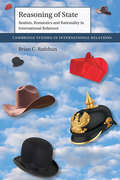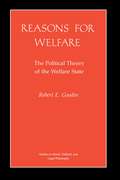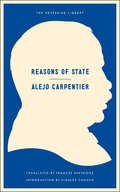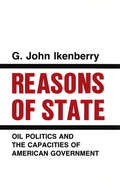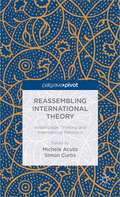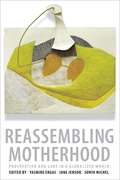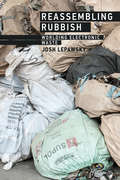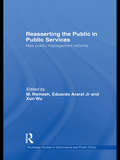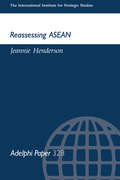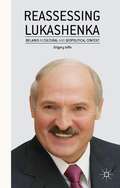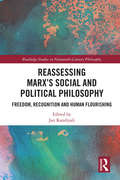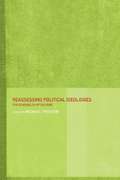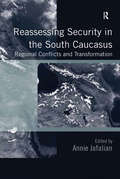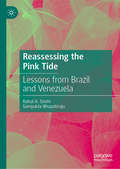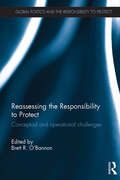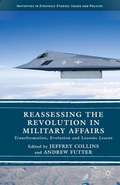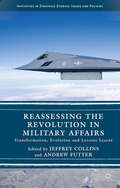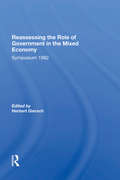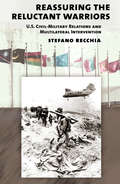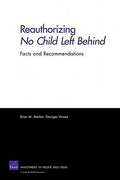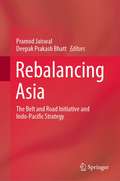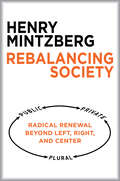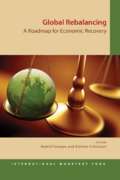- Table View
- List View
Reasoning of State: Realists, Romantics and Rationality in International Relations (Cambridge Studies in International Relations #149)
by Brian C. RathbunScholars and citizens tend to assume that rationality guides the decision-making of our leaders. Brian C. Rathbun suggests, however, that if we understand rationality to be a cognitive style premised on a commitment to objectivity and active deliberation, rational leaders are in fact the exception not the norm. Using a unique combination of methods including laboratory bargaining experiments, archival-based case studies, quantitative textual analysis and high-level interviews, Rathbun questions some of the basic assumptions about rationality and leadership, with profound implications for the field of international relations. Case studies of Bismarck and Richelieu show that the rationality of realists makes them rare. An examination of Churchill and Reagan, romantics in international politics who sought to overcome obstacles in their path through force of will and personal agency, show what less rationality looks like in foreign policy making.
Reasons for Welfare: The Political Theory of the Welfare State (Studies in Moral, Political, and Legal Philosophy #4)
by Robert E. GoodinRobert Goodin passionately and cogently defends the welfare state from current attacks by the New Right. But he contends that the welfare state finds false friends in those on the Old Left who would justify it as a hesitant first step toward some larger, ideally just form of society. Reasons for Welfare, in contrast, offers a defense of the minimal welfare state substantially independent of any such broader commitments, and at the same time better able to withstand challenges from the New Right's moralistic political economy. This defense of the existence of the welfare state is discussed, flanked by criticism of Old Left and New Right arguments that is both acute and devastating. In the author's view, the welfare state is best justified as a device for protecting needy--and hence vulnerable--members of society against the risk of exploitation by those possessing discretionary control over resources that they require. Its task is to protect the interests of those not in a position to protect themselves. Communitarian or egalitarian ideals may lead us to move beyond the welfare state as thus conceived and justified. Moving beyond it, however, does not invalidate the arguments for constantly maintaining at least the minimal protections necessary for vulnerable members of society.
Reasons of State
by Alejo Carpentier Frances PartridgeOne of the most significant novels in Latin American literature, written by Cuba's most important modern novelist--to win a bet with Gabriel Garcia Marquez.In the early 1970s, friends Gabriel García Márquez, Augusto Roa Bastos and Alejo Carpentier reached a joint decision: they would each write a novel about the dictatorships then wreaking misery in Latin America. García Márquez went on to write The Autumn of the Patriarch and Roa Bastos I, the Supreme. The third novel in this remarkable trinity is Reasons of State, hailed asthe most significant novel ever to come out of Cuba.As with Garcia Marquez, Reasons of State is a bold story, boldly told --- daring in its perceptions, rich in lush detail, inventive in prose, and deadly compelling in its suspenseful plot.Inexplicably out of print for years, it tells the tale of the dictator of an unnamed Latin American country who has been living the life of luxury in high-society Paris. When news reaches him of a coup at home, he rushes back and crushes it with brutal military force. But returning to Paris he is given a chilly welcome, and learns that photographs of the atrocities have been circulatingamong his well-to-do friends.Meanwhile World War One has broken out, and another rebellion forces the dictator back across the ocean. As he struggles with the Marxist forces beginning to find footing in his own country, and Europe is devastated, Carpentier constructs a masterful and biting satire of the new world order.
Reasons of State: Oil Politics and the Capacities of American Government (Cornell Studies in Political Economy)
by G. John IkenberryIn this lucid and theoretically sophisticated book, G. John Ikenberry focuses on the oil price shocks of 1973–74 and 1979, which placed extraordinary new burdens on governments worldwide and particularly on that of the United States. Reasons of State examines the response of the United States to these and other challenges and identifies both the capacities of the American state to deal with rapid international political and economic change and the limitations that constrain national policy.
Reassembling International Theory: Assemblage Thinking and International Relations
by Simon Curtis Michele AcutoWhat can 'assemblage' thinking contribute to the study of international relations theory? This study seeks to investigate how the various debates on assemblages in social theory can contribute to generating critical considerations on the connections and dissociation of political agency, physical world and international dynamics.
Reassembling Motherhood: Procreation and Care in a Globalized World
by Sonya Michel Jane Jenson Yasmine ErgasThe word “mother” traditionally meant a woman who bears and nurtures a child. In recent decades, changes in social norms and public policy as well as advances in reproductive technologies and the development of markets for procreation and care have radically expanded definitions of motherhood. But while maternity has become a matter of choice for more women, the freedom to make reproductive decisions is unevenly distributed. Restrictive policies, socioeconomic disadvantages, cultural mores, and discrimination force some women into motherhood and prevent others from caring for their children.Reassembling Motherhood brings together contributors from across the disciplines to consider the transformation of motherhood as both an identity and a role. It examines how the processes of bearing and rearing a child are being restructured as reproductive labor and care work change around the globe. The authors examine issues such as artificial reproductive technologies, surrogacy, fetal ultrasounds, adoption, nonparental care, and the legal status of kinship, showing how complex chains of procreation and childcare have simultaneously generated greater liberty and new forms of constraint. Emphasizing the tension between the liberalization of procreation and care on the one hand, and the limits to their democratization due to race, class, and global inequality on the other, the book highlights debates that have emerged as these multifaceted changes have led to both the fragmentation and reassembling of motherhood.
Reassembling Rubbish: Worlding Electronic Waste (The\mit Press Ser.)
by Josh LepawskyAn examination of the global trade and traffic in discarded electronics that reframes the question of the “right” thing to do with e-waste.The prevailing storyline about the problem of electronic waste frames e-waste as generated by consumers in developed countries and dumped on people and places in developing countries. In Reassembling Rubbish, Josh Lepawsky offers a different view. In an innovative analysis of the global trade and traffic in discarded electronics, Lepawsky reframes the question of the “right” thing to do with e-waste, mapping the complex flows of electronic materials. He counters the assumption that e-waste is a post-consumer problem, pointing out that waste occurs at all stages of electronic materials' existence, and calls attention to the under-researched world of reuse and repair.Lepawsky explains that there are conflicting legal distinctions between electronic waste and non-waste, and examines a legal case that illustrates the consequences. He shows that patterns of trade do not support the dominant narrative of e-waste dumping but rather represent the dynamic ecologies of repair, refurbishment, and materials recovery. He asks how we know waste, how we measure it, and how we construe it, and how this affects our efforts to mitigate it. We might not put so much faith in household recycling if we counted the more massive amounts of pre-consumer electronic waste as official e-waste. Lepawsky charts the “minescapes,” “productionscapes,” and “clickscapes” of electronics, and the uneven “discardscapes” they produce. Finally, he considers both conventional and unconventional e-waste solutions, including decriminalizing export for reuse, repair, and upgrade; enabling ethical trade in electronics reuse, repair, refurbishment, and recycling; implementing extended producer responsibility; and instituting robust forms of public oversight.
Reasserting the Public in Public Services: New Public Management Reforms (Routledge Studies in Governance and Public Policy)
by M. RameshAfter two decades of dominating the public sector reform agenda, privatization is on the wane as states gradually reassert themselves in many formerly privatized sectors. The change of direction is a response to the realization that privatization is not working as intended, especially in public service sectors. This landmark volume brings together leading social scientists, including B. Guy Peters, Anthony Cheung and Jon Pierre, to systematically discuss the emerging patterns of the reassertion of the state in the delivery of essential public services. The state under these emerging arrangements assumes overall responsibility for and control over essential public service delivery, yet allows scope for market incentives and competition when they are known to work. The recent reforms thus display a more pragmatic and nuanced understanding of how markets work in public services . The first part of the book provides the theoretical context while the second provides sectoral studies of recent reforms in healthcare, education, transportation, electricity and water supply. It includes case studies from a range of countries: Brazil, China, South Korea, Singapore, Thailand, Vietnam, USA, Hong Kong and the UK. This book will be of interest to students and scholars in Political Science, Public Administration, Public Policy, Geography, Political Economy, Sociology, and Urban Planning.
Reassessing ASEAN (Adelphi series)
by Jeannie HendersonWith the accession of Cambodia in April 1999, the Association of South-East Asian Nations (ASEAN) finally achieved its founding vision: the incorporation of all ten South-east Asian states. However, ASEAN-10 faces an unprecedented series of challenges, stemming from the organization's rapid enlargement since 1995, economic crisis among key members, and political upheavals in Indonesia, its largest and most important member. ASEAN in 1999 is a pale imitation of the more confident organization which emerged from the end of the Cold War as one of the world's most successful experiments in regionalism. This paper asks whether ASEAN can remain relevant to the management of regional problems.
Reassessing Lukashenka
by Grigory IoffeWho is Mr Lukashenka? Do Belarusians support him out of fear and/or because they are blinkered, or there are other factors that help to explain his longevity as a national leader? The book seeks answers to these questions on the premise that Lukashenka's rule ought to be viewed in the context to which it truly belongs, that is, the context of Belarusian history and identity, not as a form of government (dictatorship) deceitfully imposed on an allegedly benighted people whom better positioned and informed outsiders seek to enlighten and liberate. The author makes use of two extensive personal interviews with President Lukashenka. They present a truly unique body of primary data. Many personal traits of Belarus's president are on full display in the interviews. Anybody willing to come up with his/her opinion about Lukashenka, not necessarily in line with that of the author of this book, can use this material.
Reassessing Marx’s Social and Political Philosophy: Freedom, Recognition, and Human Flourishing (Routledge Studies in Nineteenth-Century Philosophy)
by Jan KandiyaliInterest in the study of Marx’s thought has shown a revival in recent years, with a number of newly established academic societies, conferences, and journals dedicated to discussing his thought. This book brings together distinguished and up-and-coming scholars to provide a major re-evaluation of historical issues in Marx scholarship and to connect Marx’s ideas with fresh debates in contemporary Anglo-American social and political philosophy. Among the topics discussed are Marx’s relationship to his philosophical predecessors—including Hegel, the young Hegelians, and the utopian socialists—his concept of recognition, his critique of liberalism, and his views on the good life. This book will be of interest to scholars and advanced students interested in Marx, Hegel, the history of political thought, and social and political philosophy.
Reassessing Political Ideologies: The Durability of Dissent
by Michael FreedenThis book is a high-level examination of each of the major ideologies that have shaped political thinking, action and conflict. Each chapter provides a critical overview of the current state of the major ideologies and a retrospective assessment of the strengths, weaknesses, developments and transformations of these ideologies over the past century.The volume poses a strong challenge to those who have loudly proclaimed the "end of ideology", by demonstrating that it is impossible to understand current political developments without an appreciation of their ideological context. It features internationally respected contributors who are authorities in their fields, and will be an invaluable resource for both students and specialists in areas including Politics and International Relations.
Reassessing Security in the South Caucasus: Regional Conflicts and Transformation
by Annie JafalianLying on the periphery of Europe, Russia, Turkey and Iran, and also being of interest to the United States, the South Caucasus is receiving growing attention among decision-makers and scholars of international relations. From a European perspective, the region is now forming a neighbouring area at the border of the Black Sea, as well as a corridor of oil and gas imports whose stability has become part of European security itself. As such, this volume reassesses security in the South Caucasus. It makes it possible to update analysis on security interests, perceptions and policies at national, regional and international levels through cross-national studies. Aimed at highlighting long-term defence and security trends in the region, contributors re-examine their relevance and enduring impact. They also identify changing dynamics under recent geopolitical and political developments in and around the region such as: the enlargements of NATO, the August 2008 Russia-Georgia war, the creation of the EU Eastern Partnership or Presidential elections. One of this volume's distinct contributions is that chapters have been written by experts from inside and around the region, i.e. Armenia, Georgia, Russia and Turkey, with other important contributions provided by authors from France and Canada having extensive experience in the area. Students and scholars of post-Soviet states, Eurasian geopolitics and European Security will find this volume enlightening.
Reassessing Vocational Education in China: A Perspective From PISA
by Xu JinJieBased on the international comparison of vocational education in major countries and regions, this book revisits and reappraises China’s vocational education in terms of its institutional advantages and recent outstanding performance. For a long time, vocational education in China is undervalued among the public and students in vocational schools are also underrated as academic failures. Drawing on the empirical methods and data of the Programme for International Student Assessment (PISA), the author compares vocational education across the globe, including Germany, Austria and those with traditional high-performing vocational education systems, as well as China, Japan, South Korea and other Southeast Asian countries. The results show that Chinese vocational school students performed well, especially exhibiting competency in adapting to transforming requirements for labour force in an intelligent era. The book also presents the policy achievements of vocational education in promoting equity in China. It aims to reshape the public's understanding of the competency development of students in vocational schools and give insights into promoting curriculum reform. The book will appeal to scholars and students of vocational education, education policy, Chinese education and PISA and also policymakers and practitioners of vocational education.
Reassessing the Pink Tide: Lessons from Brazil and Venezuela
by Rahul A. Sirohi Samyukta BhupatirajuThis book evaluates the record of the Left in Brazil and Venezuela, two key cases of the “pink tide” wave. The wave of Left governments that emerged across Latin America in the early 2000s – a process dubbed the “pink tide” – has been on the wane in recent years. The Left regimes that, at one point, seemed unbeatable have either been defeated at the ballot, ousted through coups or have had to contend with increasing economic and political conflicts which have nullified many of their achievements. This book argues – like many voices on the Left today – that the waning of the “pink tide” in the region must be viewed in the context of the Left’s inability to initiate radical structural changes in its constituencies. At the same time, however, the book makes the case for a more nuanced and balanced evaluation of the development record of the Left than is often done. In doing so, it seeks to go beyond the reform–revolution binary that has blinkered recent assessments and intends to highlight alternative paths that the Left could have taken.
Reassessing the Responsibility to Protect: Conceptual and Operational Challenges (Global Politics and the Responsibility to Protect)
by Brett R. O'BannonThis book explores conceptual and operational questions regarding the development and implementation of the Responsibility to Protect. The mass atrocity norm known as the Responsibility to Protect (R2P) has enjoyed meteoric success since the concept was introduced in 2001. But perhaps precisely because of how quickly the concept secured its privileged place in the pantheon of ideas and concerns in international affairs, many fundamental questions remain concerning its origins, its conceptual contents, and its relevance to actual cases of mass atrocity. This book seeks to explore that terrain by drawing together a group of scholars diverse enough to engage with the complex array of political, legal and ethical questions raised by R2P. Critical questions raised here include: What are the limits of the authority that R2P confers on international actors? What does the evolution of R2P mean for North-South relations? Just how significant is R2P in the context of the broader human rights landscape? In addition to those conceptual and theoretical matters, special attention is given to the operational context in which the meaning of R2P is ultimately rendered. As events in Africa have figured so significantly into the norm’s development, the contributors pay special attention to the problems and prospects of mass atrocity prevention in that context. This volume will be of much interest to students of the Responsibility to Protect, war and conflict studies, peacebuilding, international law, and IR/Security Studies.
Reassessing the Revolution in Military Affairs: Transformation, Evolution and Lessons Learnt (Initiatives In Strategic Studies: Issues And Policies)
by Andrew Futter Jeffrey CollinsReassessing the Revolution in Military Affairs.
Reassessing the Revolution in Military Affairs: Transformation, Evolution and Lessons Learnt (Initiatives in Strategic Studies: Issues and Policies)
by Andrew Futter Jeffrey CollinsA generation after the First Gulf War, and in the wake of a decade of counterinsurgency operations and irregular warfare, this book explores how the concept of the Revolution in Military Affairs continues to shape the way modern militaries across the globe think about, plan and fight wars.
Reassessing the Soviet Challenge in Africa
by Michael CloughBipolar Dependency: The People's Republic of Angola Marxism-Leninism in Ethiopia: Political Impasse and Economic Deterioration Mozambique: The Nkomati Accord Coming to Terms with Radical Socialism
Reassessing/ Avail.hc.only! The Mixed Economy
by Herbert GierschThis book provides a reassessment of the government's role in the provision of social insurance. It shows how President Reagan's proposal for a transition to block grants is designed to lay the responsibility for financing the spending in the hands of the same political decision-makers.
Reassuring the Reluctant Warriors: U.S. Civil-Military Relations and Multilateral Intervention
by Stefano RecchiaWhy did American leaders work hard to secure multilateral approval from the United Nations or NATO for military interventions in Haiti, Bosnia, and Kosovo, while making only limited efforts to gain such approval for the 2003 Iraq War? In Reassuring the Reluctant Warriors, Stefano Recchia draws on declassified documents and about one hundred interviews with civilian and military leaders to illuminate little-known aspects of U.S. decision making in the run-up to those interventions. American leaders, he argues, seek UN or NATO approval to facilitate sustained military and financial burden sharing and ensure domestic support. However, the most assertive, hawkish, and influential civilian leaders in Washington tend to downplay the costs of intervention, and when confronted with hesitant international partners they often want to bypass multilateral bodies. In these circumstances, America's senior generals and admirals—as reluctant warriors who worry about Vietnam-style quagmires—can play an important restraining role, steering U.S. policy toward multilateralism.Senior military officers are well placed to debunk the civilian interventionists' optimistic assumptions regarding the costs of war, thereby undermining broader governmental support for intervention. Recchia demonstrates that when the military expresses strong concerns about the stabilization burden, even hawkish civilian leaders can be expected to work hard to secure multilateral support through the UN or NATO—if only to reassure the reluctant warriors about long-term burden sharing. By contrast, when the military stays silent, as it did in the run-up to the 2003 Iraq War, the most hawkish civilians are empowered; consequently, the United States is more likely to bypass multilateral bodies and may end up shouldering a heavy stabilization burden largely by itself. Recchia's argument that the military has the ability to contribute not only to a more prudent but also to a more multilateralist U.S. intervention policy may be counterintuitive, but the evidence is compelling.
Reauthorizing No Child Left Behind: Facts and Recommendations
by Brian M. Stecher Georges VernezStudies suggest that the No Child Left Behind Act of 2001's goal of 100 percent of U.S. students proficient in reading and mathematics by 2014 will not be met. The authors recommend more-uniform state academic standards and teacher requirements and broader measures of student learning, including more subjects and tests of higher-thinking and problem-solving skills.
Rebalancing Asia: The Belt and Road Initiative and Indo-Pacific Strategy
by Pramod Jaiswal Deepak Prakash BhattThis book explores the struggle between China and the United States to expand their influence in Asia through economic assistance and defensive alliances. It brings together the diverse viewpoints of scholars from various countries on how Asian countries will exploit this geo-strategic competition to pursue their national interests, while also balancing their relations with the two great powers. The book offers a valuable asset for all those who have an interest in great power politics and international relations, especially academics, policymakers and security experts.
Rebalancing Society: Radical Renewal Beyond Left, Right, and Center
by Henry MintzbergEnough of the imbalance that is causing the degradation of our environment, the demise of our democracies, and the denigration of ourselves. Enough of the pendulum politics of left and right and paralysis in the political center. We require an unprecedented form of radical renewal. In this book Henry Mintzberg offers a new understanding of the root of our current crisis and a strategy for restoring the balance so vital to the survival of our progeny and our planet.With the collapse of the communist regimes of Eastern Europe, Western pundits declared that capitalism had triumphed. They were wrong—balance triumphed. A healthy society balances a public sector of respected governments, a private sector of responsible businesses, and a plural sector of robust communities. Communism collapsed under the weight of its overbearing public sector. Now the “liberal democracies” are threatened—socially, politically, even economically—by the unchecked excesses of the private sector.Radical renewal will have to begin in the plural sector, which alone has the inclination and the independence to challenge unacceptable practices and develop better ones. Too many governments have been co-opted by the private sector. And corporate social responsibility can't compensate for the corporate social irresponsibility we see around us “They” won't do it. We shall have to do it, each of us and all of us, not as passive “human resources,” but as resourceful human beings.Tom Paine wrote in 1776, “We have it in our power to begin the world over again.” He was right then. Can we be right again now? Can we afford not to be?
Rebalancing: A Roadmap for Economic Recovery
by Hamid Faruqee Krishna SrinivasanThis book examines imbalances in seven major economies: China, France, Germany, India, Japan, the United Kingdom, and the United States, evaluating key indicators agreed on by the G20 for identifying large imbalances, including public and private debt and private saving, and countries' external position. The chapters describe a suite of corrective steps tailored for each country that, if implemented, could improve prospective economic outcomes, creating sustainable and balanced growth for these economies. and serving as a model for other G20 countries.
